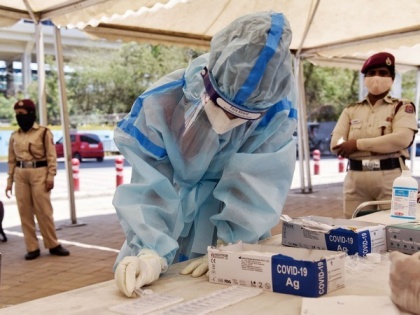Medical institute in Kerala develops RT-PCR kit with higher COVID detection accuracy
By ANI | Published: May 20, 2021 07:38 PM2021-05-20T19:38:19+5:302021-05-20T19:45:07+5:30
The Sree Chitra Tirunal Institute for Medical Sciences and Technology (SCTIMST) in Kerala, an institute under the Department of Science and Technology has developed a multiplex RT-PCR kit, where the validation shows the kit has 97.3 per cent sensitivity and 100 per cent specificity in the Covid-19 detection.

Medical institute in Kerala develops RT-PCR kit with higher COVID detection accuracy
The Sree Chitra Tirunal Institute for Medical Sciences and Technology (SCTIMST) in Kerala, an institute under the Department of Science and Technology has developed a multiplex RT-PCR kit, where the validation shows the kit has 97.3 per cent sensitivity and 100 per cent specificity in the Covid-19 detection.
This means it is unlikely to show any false positives and has only a 2.7 per cent chance of showing a false negative.
The Indian Council of Medical Research has validated the kit at the National Institute of Virology in Pune, and found it satisfactory.
"The kit developed by SCTIMST targets two SARS CoV2 genes: RdRp and ORFb-nsp14, and the human RNAse P gene as the internal control. The kit is based on multiplex Taqman chemistry, amplifying all three genes in a single reaction. The amplification time for the assay is 45 minutes, besides the time required for the RNA isolation from nasopharyngeal swab samples," the statement says.
ORFb-nsp14 is one of the least mutated genes in Covid-19. Currently, there are no kits in the market having ORF-nsp14 as the target.
The mutations on the commonly used S, R and N gene of the virus interfere with the result of an RT-PCR test. For example, the changes in the spike protein of B.1.1.7 (first found in the UK) resulted in the failure of probes for the S gene.
The turnaround time using the kit developed by SCTIMST is also faster.
A normal RT-PCR takes about five to six hours to be completed.
SCTIMST signed a non-exclusive license MoU with Huwel Lifesciences in Hyderabad on May 14 this year to commercialize the kit.
( With inputs from ANI )
Disclaimer: This post has been auto-published from an agency feed without any modifications to the text and has not been reviewed by an editor
Open in app